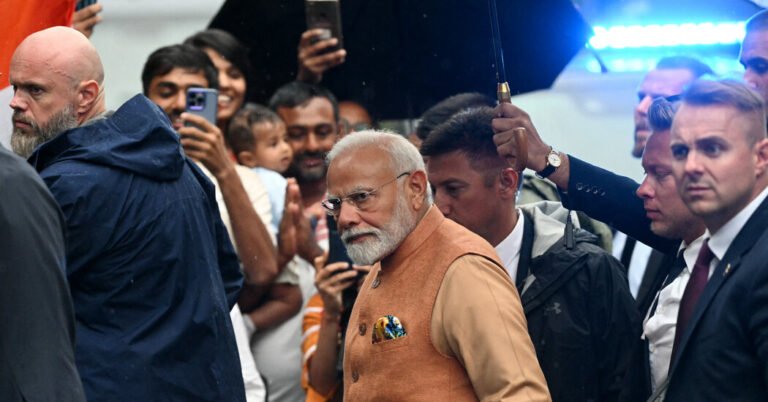
Ukrainian officials are claiming that their military incursion into Russia this month coincides with a flurry of diplomatic overtures that could strengthen Kyiv’s push for wider international backing for its negotiating position in any potential peace talks.
That diplomacy has in part been aimed at engaging neutral nations or those that lean toward Russia, including China and India. And Ukraine cited a planned visit to Kyiv on Friday by Prime Minister Narendra Modi of India as evidence that diplomatic success goes hand in hand with its offensive in Russia.
“It’s important to have diplomatic evidence that the picture is more complicated, and these players also respect Ukraine and engage with Ukraine under these circumstances,” Ukraine’s foreign minister, Dmytro Kuleba, said in an interview, referring to Mr. Modi’s visit. In July, Mr. Kuleba visited China as the Ukrainian military prepared its incursion, expressing support for a Chinese role in a peace process.
Many leaders of countries supporting Ukraine, including President Biden, have ventured to Kyiv during the war. Mr. Modi is the highest profile visit by a leader of a nation with close trade ties with Russia and political neutrality on the war.
Indian officials have said they are not seeking a mediating role but will convey messages between Ukraine and Russia if requested. India is seen as interested in a resolution to the war to avoid further isolation of Russia in the West, which could push Moscow into a closer embrace with China, India’s rival in Asia.
But India has navigated the two combatants in the war carefully. Though Mr. Modi is visiting Ukraine on Friday, he traveled to Moscow earlier this summer, where he was photographed hugging President Vladimir V. Putin on the same day a Russian cruise missile struck a children’s hospital in Ukraine, killing and wounding patients and doctors.
Economically, India has remained an important trading partner for Russia, and has propped up the Russian economy by purchasing discounted oil from companies sanctioned by the European Union and the United States.
At the same time, Mr. Modi earlier in the conflict publicly chastised Russia over the invasion, telling Mr. Putin at a meeting in 2022 that it was “not the time for war.” And now Mr. Modi plans to be in Kyiv even as Ukrainian troops occupy a swath of territory in Russia.
The visit, said Mr. Kuleba, is a “big diplomatic breakthrough” for Kyiv in its effort to press neutral nations to show balance in their relations with the warring countries. He added that Ukraine is not seeking a mediating role by India in potential talks.
Military analysts have been skeptical that Ukraine could hold the territory seized in Russia long enough for it to serve as leverage in any peace negotiations, and no talks are scheduled in any case. Ukraine diverted forces from defending inside the country to attack in Russia, and its defensive lines are now at risk of buckling near the strategic eastern Ukrainian town of Pokrovsk.
But Mr. Kuleba said the attack on Russia, in which several elite military units quickly overran border defenses and seized hundreds of prisoners, has shown that Ukraine can take the initiative, two and a half years after Russia’s full-scale invasion.
“This operation defies perhaps the most widespread argument in the West about stalemate in the war,” he said. “We showed Russia is not as strong as it pretends. And second, we demonstrated there are multiple theaters of war in this conflict.”
Ukraine is pushing the military and diplomatic tracks in parallel, he said.
In the aftermath of Ukraine’s cross-border incursion, Mr. Putin has said he won’t negotiate while Ukrainian troops are on Russian land. But Russia has yielded under pressure in the war before, Mr. Kuleba said, scaling back demands in early rounds of cease-fire talks as Ukraine routed Russia’s invading forces in fighting near the capital, Kyiv, and in negotiating safe passage for grain ships after developing nations objected to rising global food prices.
“Let’s recall that before the large-scale invasion began, and the immediate aftermath, the question sounded slightly different: How long can Ukraine hold against Russia?” he said. “The answer was no more than a week or so. Today, we’re talking about how long Ukraine can hold in the Kursk region. In terms of the war effort, I think it’s a positive change.”
Diplomatically, Ukraine is seeking to win wide international backing for its negotiating stance in any potential talks. In June, Kyiv organized a peace summit in Switzerland that endorsed three confidence building steps in the Ukrainian plan: securing grain exports, safeguarding energy infrastructure and returning civilians deported to Russia.
But those steps represented a scaled-back agenda for Ukraine, emerging after India and other countries made clear they would not sign on to Ukraine’s full 10-point plan. In the end, India attended the summit but did not sign the communiqué, objecting to a diplomatic format that did not include Russia.
India imports Ukrainian grain and agricultural goods, and along with other developing nations felt the pinch of rising food prices when Russia installed a naval blockade of Ukrainian ports. After Moscow withdrew from the pact on grain shipments, Ukraine re-established a shipping channel by attacking Russia’s fleet with exploding sea drones, forcing its ships too far from the Ukrainian coast to enforce a blockade.
But risks remain for food exports that could elevate prices in developing nations.
Mr. Zelensky and Mr. Modi are expected to discuss trade, analysts have said. But the mere presence of the Indian leader in Kyiv is perhaps the more significant development.
Stas Kozljuk contributed reporting from Kyiv, Ukraine, and Suhasini Raj from New Delhi.